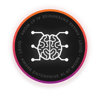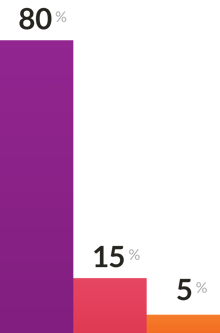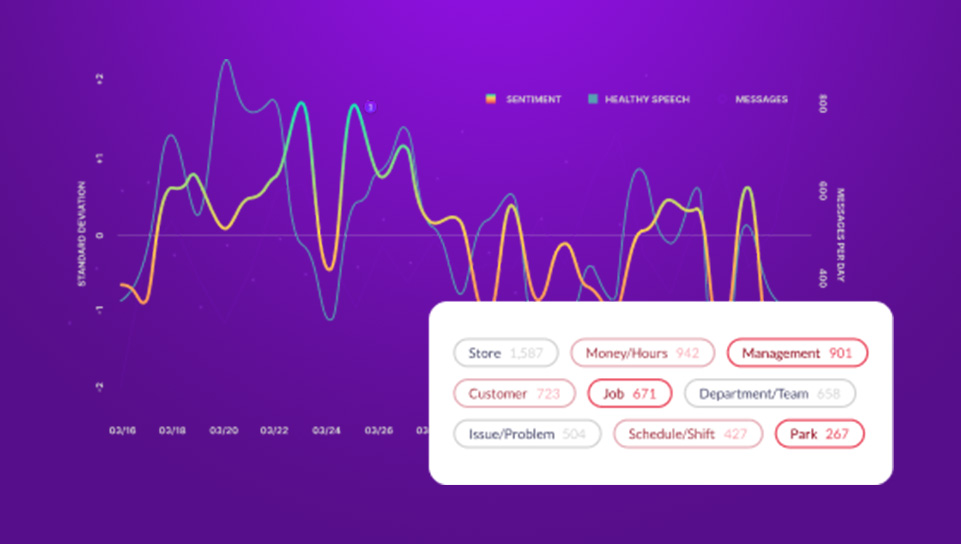Artificial Intelligence (AI) at a Startup: From 0 to 1
by Aware
Our own Vice President of Behavioral Intelligence at Aware, Dr. Jason Morgan presented on building a data science team at Techstars Startup Week Columbus.
A bit about Techstars Startup Week
Techstars Startup Week™ brings entrepreneurs, local leaders, and friends together over five days to build momentum and opportunity around your community’s unique entrepreneurial identity. Join in a celebration led by entrepreneurs and hosted in the entrepreneurial spaces you love.
Terms to Know about Data Science
There is a lot of debate regarding what the official definitions of these terms are. For the purposes of this high-level conversation, here are a few simple ways to understand these concepts:
Artificial Intelligence
 Artificial intelligence (AI) can be described as machines solving problems that are usually seen as within the purview of humans. Artificial intelligence (as we often experience it) is simply the sum of a lot of algorithms coming together to create a grandiose effect.
Artificial intelligence (AI) can be described as machines solving problems that are usually seen as within the purview of humans. Artificial intelligence (as we often experience it) is simply the sum of a lot of algorithms coming together to create a grandiose effect.
Data Science

Data science is the practice of using machine learning to predict and explain the world for the purpose of developing product or providing insights to decision makers.
NOTE: This is different from data engineering.
Machine Learning
 Machine Learning (ML) is a series of algorithms learning to answer interesting, well defined questions. Jason explains that machine learning is really more like statistical learning because these models are probabilistic versus deterministic.
Machine Learning (ML) is a series of algorithms learning to answer interesting, well defined questions. Jason explains that machine learning is really more like statistical learning because these models are probabilistic versus deterministic.
"In reality, #machinelearning is more like statistical learning. This is because these models are probabilistic versus deterministic." - @jason_w_morgan pic.twitter.com/wJpLKCsiMW
— Wiretap (@Wiretap) May 17, 2018
Questions to Ask Before Hiring a Data Scientist:
Do you have a clear business objective?
And do you need a dedicated data scientist to solve your problem?
If you simply have a dataset and aren't sure what to do with it—that's not a reason to get a data scientist. A clear objective gives the data scientist a clear sense of purpose and offers a direction as far as where to add value.
Do you have data?
Data scientists work with data. So, while you don’t need a lot of data or 'big data', some data is necessary for these individuals to do their job.
If you don’t have data, you do need a plan to get data. This might be an opportunity for a data scientist to help craft a data collection strategy.
Can you handle uncertainty?
In order to get the most out of return on your investment in a data science team, it is important to be model-driven versus data-driven.
What is a model?
A model is a simplified representation of how the world works (from the perspective of your data). Models inherently are uncertain and data scientists systematically work to learn and gain insights from those errors.
Model-driven organizations accept that data models are not perfect and are willing to make decisions based on that model.
The good news is that data science can put bounds on that uncertainty allowing leaders to make better informed decisions, but an organization would need to be uncomfortable with that uncertainty.
Many companies want to be data-driven, but to get the most from a data science team an organization should be model-driven and needs to be ready for that leap. #DataScience #Startup pic.twitter.com/JO3BhlQnC7
— Wiretap (@Wiretap) May 17, 2018
Build A Team With Intention
1. Consider Hiring a product manager Before building a Data science team
Traditionally, executives set the vision for the company and product managers lay map for how to get there.
In the context of data science, a product manager sets a clear path from data to value for the business and the company.
If you aren't ready to commit one person exclusively to product road-mapping, have a strategy for who in your organization is driving product strategy.
Consider hiring a #productmanager before building a #datascience team. @CMHStartupWeek #Startup pic.twitter.com/6SkENpRQ7Q
— Wiretap (@Wiretap) May 17, 2018
2. Consider a Data Engineer
Data scientists don’t usually put models into production. This is another reason why you might want a data engineer – to take that model and make it digestible and consumable by decisionmakers.
3. Hire for the Problem
There is a common misconception that a data scientist needs a Ph.D. in physics or come from a top university. While those credentials carry a lot of merit, seeking out these candidates may not be necessary for your organization's needs.A few examples:
- If you have time series data, you probably want to hire an econometrician who is trained to deal with this type of data.
- If you are working with survey data or experiments, you might seek candidates from a psychology or behavioral science background.
- If you are working on the internet of things, you may want someone with signal processing engineering experience.
What to Expect From a Data Science Team
Remember, data science is a highly iterative, uncertain process.
Data Scientists Don't Do Cool Stuff Every Day:

80% of the time
They look at the data. Data is messy and needs love before drawing insights.
15% of the time
They perform age-old, non-sexy analyses (e.g. linear regression and crosstabs) to develop broad insight into the problem they are trying to solve.
5% of the time
They develop the predictive and analytic models to solve the problem. This is the 'really cool stuff.'
Data scientists often don't know what the data will say until they get into the data. It is also completely normal to discover that some approaches and models don't work.
We Tried Our Best to Give You the Highlights...
But this session was full of amazing insights and there was too much to include in this blog.
Build an amazing #DataScience team and expect great things, in time.
— Wiretap (@Wiretap) May 17, 2018
- @jason_w_morgan@CMHStartupWeek #CMHStartupWeek pic.twitter.com/A4FOemPyWk
Learn how Aware's data scientists have developed out industry-leading AI and machine learning data platform. Go now.







